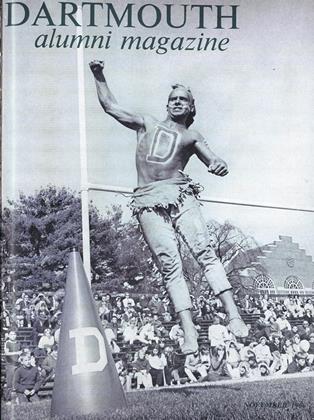The Walter Mitty dreams of most college seniors are never realized. Job Corps Deputy Director DAVID F. SQUIRE '47 had glorious thoughts of teaching, earning a million, and doing social work.
Dave was a pragmatic dreamer. Money won. "You might say," he recalls, "that I didn't want to mow my own lawn."
But he made a less realistic selfpledge: to get out of business at 40 and go into teaching or public service. He kept a file of subjects he might want to teach and of organizations that interested him. At 37 he could afford to pursue these interests, so he sold his business and agreed to stay three years to help the new owners.
President Dickey discouraged him from teaching. His accomplishment in transforming the near bankrupt Ansonia Mills in Taunton, Mass., into a flourishing producer of modern elastic fabrics with a 20% annual growth pattern —in just four years - was indeed impressive. But it would not be equated with a Ph.D. and allow him to teach at that level, and President Dickey advised that a lesser teaching challenge would frustrate him.
Dave turned to public service and was attracted most to the Office of Economic Opportunity where he "could get closer to the real job."
"This is a perfect combination of all my interests sociology, teaching, business," he says of the Deputy Director's position.
Dave has kept up the pace that made him a textile leader. He works from 7 a.m. sometimes until 12:30 the following morning and sees his family in Stamford, Connecticut, only on weekends.
Still the businessman, he visits work centers and determines staffing and budget needs. He also coordinates all centers with each other and with government and local agencies and their operating universities, colleges, and private organizations.
The Job Corps provides a complete rehabilitation program for up to two years for young men and women, 16 to 21, who are school dropouts. At urban and rural conservation centers they receive basic and vocational education, medical attention, a clothing allowance and small salary, guidance and counseling, and job placement - at an annual cost of about $4500 per corpsman.
But, Dave points out, "The government will get its money back from these kids in five years."
In June of this year there were 30,000 trainees in 108 Job Corps centers. By next June there will be 45,000 corpsmen in 135 centers. All graduates to date are working, serving in the military, or back in school.
"It takes courage to admit that you lack the abilities that others take for granted," he says. He tells of one North Carolina corpsman who learned to read and wrote his first letter to his grandmother. He showed Dave the reply:
DEAR RALPH, Thank you for your letter. God bless you for making me the happiest person in the world. Getting a letter from you makes me feel so proud. I always knew that you could be someone. Keep up the good work. We are all so proud.
"I've gained a hell of a lot more than I've given," Dave says.
 View Full Issue
View Full Issue
More From This Issue
-
 Feature
FeatureNotes on the New Europe
November 1966 By Bernard D. Nossiter '47 -
 Feature
FeatureCHAIRMAN'S REPORT 1905-1966 CAMPAIGN
November 1966 By Rupert C. Thompson. Jr. '28 -
 Feature
FeatureTHE RACE TO BE HUMAN
November 1966 -
 Feature
FeatureMoosilauke Area Doubled
November 1966 By Robert S. Monahan '29 -
 Feature
FeatureFederal Judge
November 1966 -
 Feature
FeatureNorth Country Doctor
November 1966
Features
-
 Feature
FeatureHOW THE "IVY LEAGUE" GOT ITS NAME
November 1961 -
 Feature
FeatureThe Case of the Prodigal Son
MARCH • 1986 By Bruce Ducker '60 -
 Feature
FeatureFrom Rap to Ritual
SEPTEMBER 1998 By Everett Wood '38 -
 Feature
FeatureFive Deadly Threats
November 1976 By John G. Kemeny -
 Feature
FeatureA Day in the Life
Mar/Apr 2004 By JONI COLE, MALS ’95 -
 Feature
FeatureStudent Activism at Dartmouth
MAY 1966 By RICHARD A. BATHRICK '66

